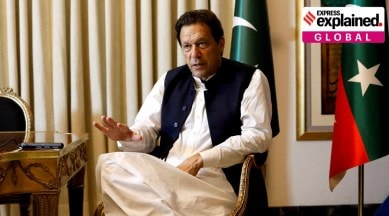What is the Toshakhana case, in which Imran Khan has been sentenced to a 3-year jail term?
Former Pakistan Prime Minister Imran Khan was found guilty of not disclosing information on gifts presented to Toshakhana, and the revenue received from the alleged sale of these gifts which amounted to as much as 140 million Pakistani rupees ($635,000).

Former Pakistan Prime Minister Imran Khan was arrested on Saturday (August 5) afternoon from his Zaman Park residence in Lahore, shortly after an Islamabad trial court declared him guilty of “corrupt practices” in the Toshakhana case.
The court sentenced Imran to three years in prison and imposed a fine of 100,000 Pakistani rupees on him for concealing details of Toshakhana gifts, Dawn reported.
monthly limit of free stories.
with an Express account.
“Imran Khan deliberately submitted fake details [of Toshakhana gifts] to the ECP and is found guilty of corrupt practices,” Additional District and Sessions Judge Humayun Dilawar stated.
The former PM was sentenced under Section 174 of the Pakistan’s Election Act. Imran was given the maximum punishment by the judge in this case, with his conviction pretty much ending his chances of participating in Pakistan’s upcoming national elections, scheduled to take place in November.
In a statement, Khan’s political party Pakistan Tehreek-e-Insaf (PTI) said they had already moved the Pakistan’s Supreme Court over the district court case, Reuters reported.
What is the Toshakhana case?
The Toshakhana controversy came to the forefront in August 2022, when the coalition government — led by Pakistan Muslim League-Nawaz (PML-N) — filed a case against Imran, claiming that he did not disclose information on gifts presented to Toshakhana as well as the proceeds from the “illegal” sale of some the gifts.
Established in 1974, Toshakhana is a department under the administrative control of the Cabinet Division which stores gifts and other expensive items received by public officials. According to its rules, it’s compulsory for officials to report the gifts and other such materials received by them to the Cabinet Division.
However, when Imran came to power in 2018, he resisted disclosing details of the many presents he received during his time in office, saying that doing so would severely impact relations with other countries.
Subsequently, the former prime minister wrote a letter to the Election Commission of Pakistan (ECP) and admitted to selling at least four such presents but also said that he bought them from the government by paying a percentage of their value. These included a Graff watch gifted to him by the Saudi Arabian crown prince, Rolex watches, expensive cufflinks, a valuable pen and a ring.
What did the ECP say about the case?
Almost two months after the case was filed against Imran, the ECP found that while the sales weren’t illegal because the items belonged to Imran as he had paid for them, he did engage in unethical behaviour, making false assertions and erroneous declarations. Consequently, Pakistan’s apex poll body barred Imran from holding public office for a period of five years.
In its ruling, it said, “We are of the considered opinion that the respondent has become disqualified under Article 63(1)(p) of the (Pakistan) Constitution read with Sections 137,167 and 173 of the Elections Act, 2017, consequently he ceases to be a member of the National Assembly of Pakistan and his seat has become vacant accordingly”.
What happened after Imran was disqualified?
Soon after the announcement of the ECP’s decision, huge protests led by PTI workers broke out in front of the poll body’s offices across the country. Multiple instances of vandalism were reported during these demonstrations and protesters clashed with the police. A case of terrorism was then registered against Imran, alleging that the PTI leadership had encouraged violent protests after the ECP disqualified the prime minister in the Toshakhana case.
The ECP itself approached the Islamabad sessions court with a copy of the complaint, and sought criminal proceedings against Imran for allegedly misleading officials about the gifts he received from foreign dignitaries during his tenure as the prime minister.
Imran Khan was formally indicted in the case May 10. However, on July 4, the Islamabad High Court (IHC) stayed the proceedings and directed ADSJ Dilawar to re-examine the matter to decide on its maintainability. ADSJ Dilwar ruled on July 9 that the case was maintainable and consequently revived the proceedings.